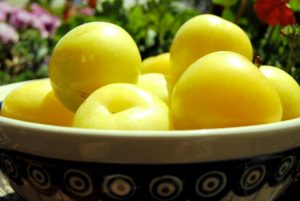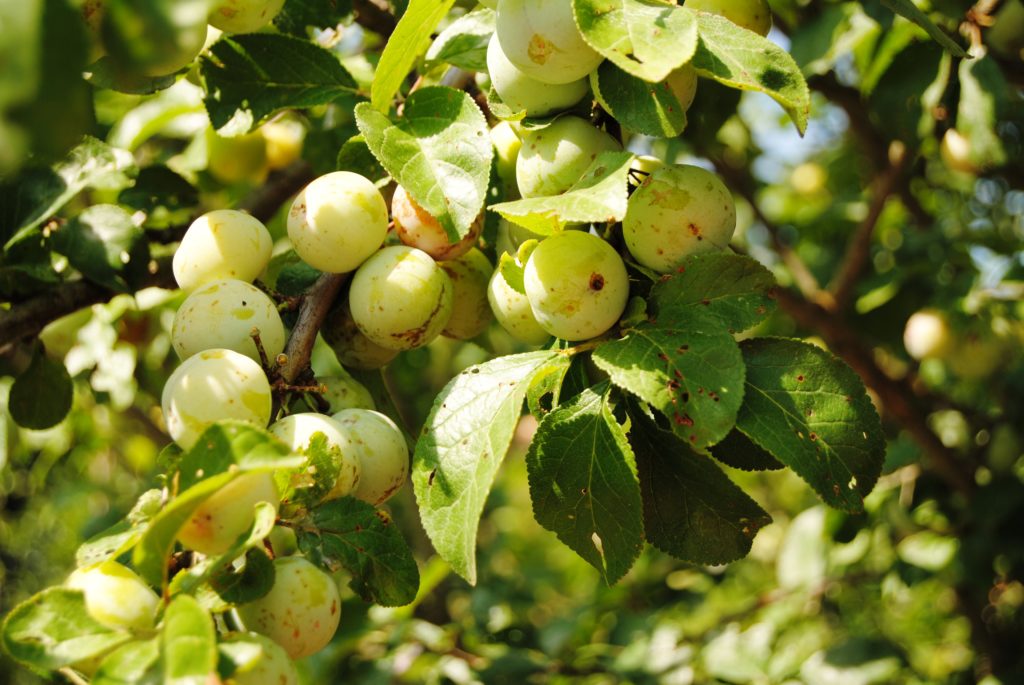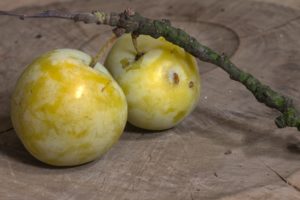
He put up a fine luncheon for us and added to it a quantity of great light-green plums, the pleasantest fruit in Germany…. Mark Twain, A Tramp Abroad
Greengages
Anna Pavord, writing for the British newspaper Independent, calls them “most ambrosial of all tree fruit.”
David Karp describes them as “the best fruit in the world” in the New York Times.
Mark Twain traveled to Germany in 1878 and tried them at his hotel in Heilbronn, where he dubbed them the “pleasantest fruit in Germany.”
With respect to sweetness, all three authors have a point. Greengages taste like honey. Long considered one of the sweetest fruits, the green plums enjoy a delectably “noble” reputation in Germany. Germans call them the “queen of the plums.” David Karp measured their sugar content in France with his refractometer and obtained a value, 30.5, that nearly went off the scale.

Hard to grow
You’ll have a hard time finding fresh greengages in America. They’re difficult to grow. Rain can make them split open. It’s expensive to pick the fruit. And they don’t produce regularly – greengage trees will sport a bumper crop one year and the next, for no apparent reason, grow only a few plums. And to make it worse, you should really leave them on the tree until they’re ripe. They taste best fresh off the tree.
Popular in Europe, but not America
Greengages originated in the Middle East. France has had them since the 15th century. In both Germany and France, the fruit is named after Queen Claude (d. 1524): Reine-Claudes, Reineclaude, or Reneklode. She must have liked the light green plums as much as Twain did.
The fruit came to England in the 17th century. The man who introduced them, Sir William Gage of Suffolk, also lent them his name.
Greengages were once popular in the United States, but farmers found them too difficult to grow. They have almost vanished from the American orchards and tables. Across the ocean, however, greengages surfed a juicy wave of popularity in the 19th century – at the time Mark Twain tried them in Heilbronn. In fact, German markets of the 18th century often forbade all other plum varieties outside of greengages and mirabelles. The other varieties were thought to be unhealthy.

Pleasantest fruit of the summer?
Summer begins this week, and after that the plum season will soon be upon us. Keep your eyes open for the queen of the plums at the marketplace and offer yourself a treat Mark Twain once enjoyed. One taste might transport you to ambrosial heaven.
Have you ever had the opportunity to try a greengage? If so, what did you think of the taste?
Literature on point:
Karl Günther Barth, “Die Königin der Pflaumen – ein fast vergessene Sorte,” Hamberger Abendblatt (2 August 2014).
Rudolf Habs & L. Rosner, Appetitlexikon (Insel Verlag 1982).
David Karp, “A Finicky Fruit Is Sweet When Coddled,” New York Times (1 Sept. 2004).
Anna Pavord, “Plum job: A juicy guide to greengages and plums,” Independent (12 August 2011).
“Reineclaude,” Lebensmittel Warenkunde (2017).
Reneklode aus Oullins, Manufactum
Mark Twain, A Tramp Abroad, ch. 14 (public domain).



I’ve heard of greengages, without knowing just what sort of fruit they were. There’s a farmer’s market in my area; I’ll see if they ever turn up there.
Even here in Germany, they can be hard to find. I’ve only found them once in the grocery store — specialty farmers’ markets are better. I hope you find some and that you like them!
Thanks for commenting, Undine.
I have a greengage tree in my garden here in the UK. Only 2 fruits last year, but it the tree is laden this. I feel honoured to have it growing now!! Dan, Leicester, UK
Here’s to lots of good harvests over the coming year, Dan. If you have way too many (which is unlikely), feel free to invite me over! Maybe we should plant a greengage tree in our own garden. We already have one plum tree, and I think that’s all a greengage needs to cross-pollenate.
The page you have created is very beautiful and it must not have been so easy, you must have found it very difficult because it is not an easy task to write your thoughts in words, I love your written words, keep writing in the same way.
Thank you!